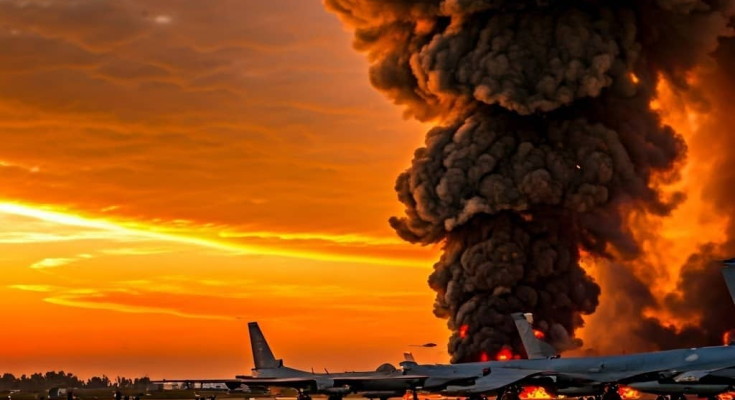
Tensions in the Middle East have escalated dramatically as Iran has issued stark warnings to the United States, threatening “all-out war” should the U.S. become directly involved in the ongoing conflict with Israel.
According to reports, Tehran is actively preparing to strike American military bases in the region, raising fears of a broader regional conflict.
Iranian officials have signaled their readiness to retaliate against U.S. forces if Washington joins Israel’s military campaign against Iran.
This warning comes amid heightened tensions following Israel’s recent airstrikes on Iranian nuclear and military targets, which Tehran claims were coordinated with the U.S. Iran’s Defense Minister, Aziz Nasirzadeh, stated, “If a conflict is imposed on us … all U.S. bases are within our reach and we will boldly target them in host countries,” during a press briefing.
This rhetoric underscores Iran’s intent to expand its retaliation beyond Israel to include American assets if provoked.
The New York Post reported that Iran’s threats are not merely rhetorical, as intelligence suggests Tehran is preparing missiles and other military equipment for potential strikes on U.S. bases across the Middle East, including those in Iraq, Jordan, and Saudi Arabia, where over 40,000 U.S. troops are stationed.
These preparations follow Israel’s “Operation Rising Lion,” which targeted Iran’s nuclear facilities and military infrastructure, killing key military commanders and scientists. Iran’s response has included launching hundreds of ballistic missiles and drones at Israel, with some causing civilian casualties.
The U.S. has denied direct involvement in Israel’s strikes, with Secretary of State Marco Rubio emphasizing that the actions were “unilateral” and that the U.S. priority is protecting American forces in the region.
However, Iranian officials, including Foreign Minister Abbas Araghchi, have claimed “solid evidence” of U.S. coordination, further fueling Tehran’s distrust.
The Trump administration has evacuated nonessential personnel from embassies and military bases in the region, a move President Trump described as precautionary to avoid potential missile attacks.
Analysts warn that Iran’s threats could materialize through direct missile strikes or attacks by proxy groups like the Houthi militia in Yemen or pro-Iranian militias in Iraq and Syria.
Such actions could disrupt critical shipping routes, including the Strait of Hormuz, and escalate the conflict into a broader war.
The situation remains precarious as nuclear talks between the U.S. and Iran falter, with Trump expressing dwindling confidence in reaching a diplomatic resolution to curb Iran’s nuclear ambitions.
As the region teeters on the brink, the international community watches closely, with fears growing that any miscalculation could draw the U.S. into a conflict with far-reaching consequences.



